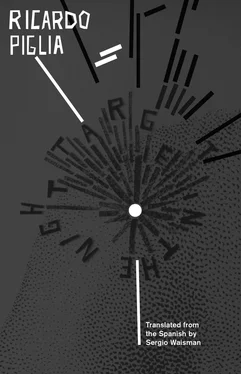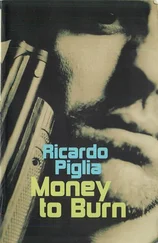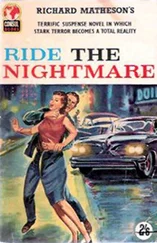Ricardo Piglia - Target in the Night
Здесь есть возможность читать онлайн «Ricardo Piglia - Target in the Night» весь текст электронной книги совершенно бесплатно (целиком полную версию без сокращений). В некоторых случаях можно слушать аудио, скачать через торрент в формате fb2 и присутствует краткое содержание. Год выпуска: 2015, Издательство: Deep Vellum, Жанр: Современная проза, на английском языке. Описание произведения, (предисловие) а так же отзывы посетителей доступны на портале библиотеки ЛибКат.
- Название:Target in the Night
- Автор:
- Издательство:Deep Vellum
- Жанр:
- Год:2015
- ISBN:нет данных
- Рейтинг книги:3 / 5. Голосов: 1
-
Избранное:Добавить в избранное
- Отзывы:
-
Ваша оценка:
- 60
- 1
- 2
- 3
- 4
- 5
Target in the Night: краткое содержание, описание и аннотация
Предлагаем к чтению аннотацию, описание, краткое содержание или предисловие (зависит от того, что написал сам автор книги «Target in the Night»). Если вы не нашли необходимую информацию о книге — напишите в комментариях, мы постараемся отыскать её.
is an intense and tragic family history reminiscent of
, in which the madness of the detective is integral to solving crimes.
, a masterpiece, won every major literary prize in the Spanish language in 2011.
Ricardo Piglia
Target in the Night — читать онлайн бесплатно полную книгу (весь текст) целиком
Ниже представлен текст книги, разбитый по страницам. Система сохранения места последней прочитанной страницы, позволяет с удобством читать онлайн бесплатно книгу «Target in the Night», без необходимости каждый раз заново искать на чём Вы остановились. Поставьте закладку, и сможете в любой момент перейти на страницу, на которой закончили чтение.
Интервал:
Закладка:
But his life was not suspended. When he reached his room and started taking off his clothes, the telephone rang. It was Julia from Buenos Aires.
“You need to stop, Emilio,” she said when he picked up the receiver. “Everyone’s asking me about you. Where’d you go? I had to call the newspaper to locate you. Look at the hour. A letter arrived here for you, from your brother.”
Renzi tried to explain that he couldn’t come by to pick up the letter because he was working in a small, lousy town in the province of Buenos Aires, but he realized that Julia didn’t believe him. She hung up on him mid-sentence. She must have thought that he was lying to her, that he’d taken off and holed up with some chick in a hotel somewhere, he was sure of it.
Several friends had told him that she’d been saying that he was sinking. After his father’s death, which he had no intention of re-opening, he had decided to separate from Julia. But he hadn’t changed his address yet, and people were still looking for him at his ex’s. He would’ve liked to have been like Swann, who in the end discovers that he’s been consumed by his desire for a woman who wasn’t truly worth it. But Renzi was still so connected to Julia that six months after leaving her, just hearing her voice was enough to make him feel lost again. He loved Julia much more than he had loved his father, but the comparison was ridiculous. For the moment he was trying not to make connections between unrelated events. If he could keep everything separate he would be okay.
He looked out the window in his room toward the square. On the street he saw the lame dog, walking crooked. It moved in short jumps, until it stopped under a corner streetlight. Bravo had said it was the Inspector’s dog. Renzi saw the dog lift its leg to urinate and shake its yellow fur as if it were soaked. Renzi lowered the curtain and got in bed and dreamt he was attending Tony Durán’s funeral in a cemetery in Newark. It was actually the cemetery in Adrogué, but it was in New Jersey and it had old tombstones and markings near the sidewalk on the other side of an iron fence. A group of solemn women and mulattos were saying their farewells. Renzi walked up to the open grave and saw the lead coffin, shining in the sun, being lowered into the earth. He picked up a handful of dirt and threw it in.
“Poor son of a bitch,” Renzi said in his dream.
When he woke up he remembered he had dreamed, but not the dream.

16 Soon after this, Ada bought herself a Triumph 220. Since then, she rides around town on her motorcycle all the time, scaring the locals and the birds in the corrals. The dogs run after her, barking as if possessed, chasing behind her on the motorcycle.
17 “Today the remains of the soldier Luis Ángel Medina were laid to rest in the cemetery of San Justo, having been shot to death yesterday by two women from an extremist commando group. It would have been Medina’s last guard duty, since he was about to complete his military service and would have been discharged the following Friday. However, because of a routine assignment, he was destined to cover the post at which he met his death precisely on that fatal day” ( La Razón , March 14, 1972).
18 In his notes for a book on Dostoevsky (1916), speaking about political crime, G. Lukács cites Bakhtin: Murder is not allowed, murder is an absolute, unforgivable sin. He certainly cannot be, but he must be executed. The authentic revolutionary, like the tragic hero, faces evil and accepts its consequences. Only a crime comitted by a man who knows resolutely and beyond all doubt that murder cannot be sanctioned, under any circumstance, is naturally moral. In this fashion Lukács distinguishes between the first — or Kantian — ethic, which outlines responsibilities according to the immediate needs of society, and the second ethic, which focuses on transcendence. Lukács cites Kierkegaard’s Fear and Trembling on this point: Direct contact with transcendence in life leads to crime, madness, and absurdity (Note by Renzi).
9
Croce had a blurry photograph of an unknown man with an outstanding warrant published in the local newspapers, but no one really understood what was going on. Even Saldías started to express his doubts, timidly. The Scribe quickly went from blind admiration to concern to suspicion. Croce didn’t pay any more attention to him and, instead, left him out of the loop, ordering him to dedicate his time to typing up a report with the new theories about the crime.
That’s when the prosecutor Cueto took center stage and started making decisions designed to put a stop to the scandal. He maintained that Croce’s hypotheses were wildly ridiculous and served only to hinder the investigation.
“We don’t know what the alleged suspect that Croce is looking for has anything to do with the murder. No one around here knows that man, he has no connection to the victim. We’re living through some pretty chaotic times, but we will not allow an old country inspector to go around doing whatever he wants.”
He had the state police transfer Yoshio right away to the jail in Dolores, for his own safety, as he said, while he proceeded with his own prosecutorial investigation. They hadn’t found the murder weapon, but there were eyewitnesses who placed the suspect at the place and time where and when the crime had been committed. Cueto did everything necessary to close the case and label it a sex crime. In a low voice, to whoever wanted to hear, the Prosecutor assured people that the Inspector could no longer be trusted and that he had to be removed. In the meantime, Croce continued to go about town as always, waiting for some new development. No one really knew what he was thinking, or why, or why he believed that Dazai wasn’t guilty.
One night, at dinnertime, Renzi ran into Croce at the Madariaga Tavern. Sitting at the table by the side window, the Inspector was eating a rump roast with French fries, drawing small figures on the paper tablecloth with a pencil while he ate. Every once in a while he’d stop moving and stare into space, holding up his glass of wine.
In his work as a reporter, Renzi occasionally covered police stories, and he’d met a number of inspectors. Most were thugs without any morals who just liked having their position on the force so they could get women to sleep with them (especially the prostitutes) and acquire an upper hand into as many shady deals as possible. But Croce seemed different. He had the peaceful air of a paisano you could trust, Renzi thought — and all of a sudden he remembered the opinion that the editor at his newspaper, Luna, had about police inspectors.
“Who wouldn’t want to be an inspector?” Old-Man Luna said to him one night. “Don’t be so naïve, kid. Inspectors are the real heavies. Over forty, they’ve already put on some weight, they’ve seen everything, most have a few kills under their belts. Inspectors are men who’ve lived a lot, they have a ton of authority, they spend their time with delinquents and political strongmen, always out at night, in cathouses and bars, getting whatever drugs they want, making easy money because everyone greases them: bookies, dealers, mafiosos, neighbors. They’re our new heroes, kid. Always armed, they can get in anywhere, form a gang, knock down doors. They’re specialists of evil, the damned, their job is to make sure idiots sleep at night, they do the dirty work on behalf of the beautiful. Moving between the law and the world of crime, they fly in between. Half and half, if someone changed the balance on them they wouldn’t be able to survive. They’re the guardians of our security. Society delegates to them the role of taking care of what no one wants to see,” Luna told him. “They do politics all the time, but they never get in as politicians, when they get involved in politics it’s to take down some mid-level puppet, a mayor, a representative or two, but they never go any higher. They’re clandestine heroes, always tempted to run themselves, but they never do. If they did they’d be done, they’d become too visible,” Luna told him that night over dinner at El Pulpito, schooling him, once again, on real life. “They do what they have to do and they endure beyond all the changes, they’re eternal, they’ve always been there—” Luna hesitated at that point for a moment, Renzi remembered, then continued: “There’s been famous police inspectors ever since the times of Rosas, sometimes they lose, like anyone else, they get killed or retired or sent to jail, but there’s always another one right behind them to take their place. They’re malevolent, my dear, but the level of evil in them is minimal compared to the men who give them their orders. Cops will give it to you straight, they’re the ones in the trenches,” Luna concluded. “So don’t be crazy, just write what they tell you.” I’m going to do what he said, Renzi thought, remembering Old-Man Luna’s advice when he saw Croce gesturing for him to come over.
Читать дальшеИнтервал:
Закладка:
Похожие книги на «Target in the Night»
Представляем Вашему вниманию похожие книги на «Target in the Night» списком для выбора. Мы отобрали схожую по названию и смыслу литературу в надежде предоставить читателям больше вариантов отыскать новые, интересные, ещё непрочитанные произведения.
Обсуждение, отзывы о книге «Target in the Night» и просто собственные мнения читателей. Оставьте ваши комментарии, напишите, что Вы думаете о произведении, его смысле или главных героях. Укажите что конкретно понравилось, а что нет, и почему Вы так считаете.












